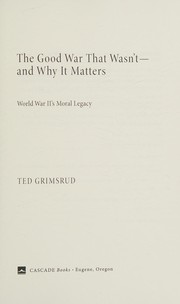- Summary
- A war is always a moral event. However, the most destructive war in human history has not received much moral scrutiny. The Good War That Wasn't--and Why It Matters examines the moral legacy of this war, especially for the United States. Drawing on the just war tradition and on moral values expressed in widely circulated statements of purpose for the war, the book asks: How did American participation in the war fit with just cause and just conduct criteria? Subsequently the book considers the impact of the war on American foreign policy in the years that followed. How did American actions cohere (or not) with the stated purposes for the war, especially self-determination for the peoples of the world and disarmament? Finally, the book looks at the witness of war opponents. Values expressed by war advocates were not actually furthered by the war. However, many war opponents did inspire efforts that effectively worked toward the goals of disarmament and self-determination. The Good War That Wasn't--and Why It Matters develops its arguments in pragmatic terms. It focuses on moral reasoning in a commonsense way in its challenge to widely held assumptions about World War II.
- Variant Title
- Good war that was not
- Format
- Book
- Author/Creator
- Grimsrud, Ted, 1954- author.
- Published
- Eugene, Oregon : Cascade Books, [2014]
©2014
- Contents
-
1. Introduction: The United States and the myth of redemptive violence
Part One: Total war. 2. Why did America go to war? ; 3. Was America's conduct in World War II just? ; 4. What did the war cost?
Part Two: Aftermath. 5. Pax Americana ; 6. The Cold War ; 7. Full spectrum dominance
Part Three: Alternatives. 8. No to the war ; 9. Social transformation ; 10. Servanthood ; 11. Conclusion: World War II's moral legacy.
- Notes
-
Includes bibliographical references (pages 267-276) and indexes.
1. Introduction: The United States and the myth of redemptive violence -- Part One: Total war. 2. Why did America go to war? ; 3. Was America's conduct in World War II just? ; 4. What did the war cost? -- Part Two: Aftermath. 5. Pax Americana ; 6. The Cold War ; 7. Full spectrum dominance -- Part Three: Alternatives. 8. No to the war ; 9. Social transformation ; 10. Servanthood ; 11. Conclusion: World War II's moral legacy.




